
Partibrejkers is a Serbian rock band from Belgrade, as well as one of the most acclaimed acts of the Yugoslav rock scene.

Eto! Baš hoću! is the third studio album by Yugoslav rock band Bijelo Dugme, released in 1976.
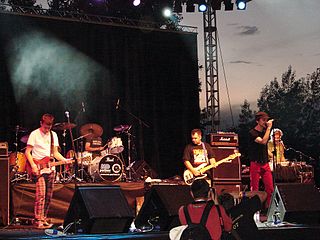
Obojeni Program is a Serbian alternative rock band from Novi Sad. The band are pioneers of the Serbian alternative rock scene. The first letters of the band's first seven studio albums form an acronym of their home town. They have performed at every Exit festival since the first in 2000, with the exception of the virtual Exit held in September 2020.
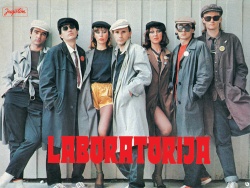
Laboratorija Zvuka, sometimes credited as Laboratorija (Laboratory) only, was a Serbian and former Yugoslav rock band. Noted for their eccentric style, erotic lyrics, unusual line ups and bizarre circus-inspired stage performances, Laboratorija Zvuka were one of the pioneers of the Serbian and former Yugoslav alternative rock scenes.

Soldatski bal is the first studio album by the Yugoslav band Plavi orkestar, released in 1985. With over 500,000 copies sold, it is the best-selling debut album in Yugoslavia and its successor states.
Generacija 5 is a Serbian and former Yugoslav band from Belgrade. The band was formed in 1977 and initially performed jazz rock, later moving to harder rock sound, achieving nationwide popularity and releasing a number of hits during the late 1970s and early 1980s.

Ratne igre is the second studio album from Serbian and former Yugoslav hard rock band Kerber, released on 14 March 1985.

Igra Staklenih Perli was a Yugoslav progressive/psychedelic rock band formed in Belgrade in 1976.

Warriors is the first studio album from former Yugoslav/Canadian heavy metal band Warriors.

La Strada was a Serbian and former Yugoslav new wave and later alternative rock band from Novi Sad.
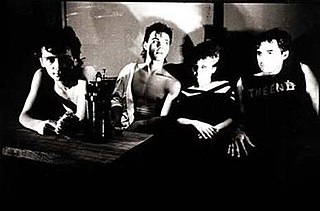
Luna was a Serbian and former Yugoslav post-punk/gothic rock band from Novi Sad.
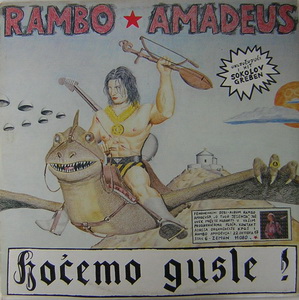
Hoćemo gusle is the second studio album released in 1989 by Montenegrin-Serbian musician Rambo Amadeus.

Distorzija (Distortion) is the fifth studio album by the Serbian/Yugoslavian new wave band Električni orgazam. It was released in 1986 by Jugoton.
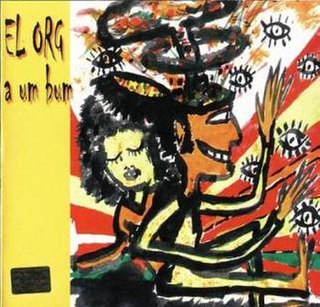
A um bum is the eighth studio album by the rock band Električni Orgazam. It was released in 1999 on City Records. This is the only album the band had released under the record company.

Strah od monotonije is the second and last studio album by the Serbian band Pekinška Patka, released in 1981. Unlike its predecessor which was a punk rock album, Strah od monotonije featured the post-punk sound, and is the first post-punk album released in Serbia.

Zašto ne volim sneg is the fifth studio album by the Serbian rock band Smak, released in 1981. It was released as LP and music cassette. It contains seven tracks, most famously Smak's version of Macedonian folk song "Zajdi, zajdi". It is agreed upon the band to be a Točak's solo effort, impelled only by the record label to be published as a 'SMAK' record. 'Južni voz' is a common live staple.

Svi za mnom! is the second album by the Serbian alternative rock band Disciplina Kičme, released by the Slovenian record label Helidon in 1986, and reissued on CD by the record label in 1997. A remastered version of the album was rereleased on CD on the compilation album Ove ruke nisu male... 2 in 2005.
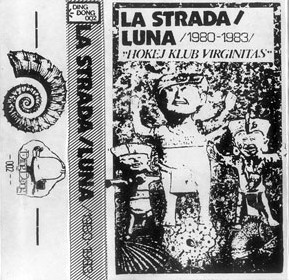
Hokej Klub Virginitas is a semi-official compilation album by the Serbian new wave/post-punk bands La Strada and Luna, released in 1988 by Ding Dong Records. The compilation, available on compact cassette only, features recordings made by La Strada at the Peđa Vranešević studio in Novi Sad, consisting of the tracks "On" ("Himself") and "Sat" ("Clock"), Luna recordings "Spori Metropolis", recorded at the Ben Akiba theatre June 27, 1983, an entire March 11 performance at the KCM Sonja Marinković, and the band's early demo recordings made at the Radio Novi Sad and Meta Sound Studio during 1982 and 1983.

Kozmetika is the only album by the eponymous Yugoslav new wave band. It was released in 1983.

Opus 1 is the debut and only studio album by Yugoslav progressive rock band Opus, released in 1975.




















